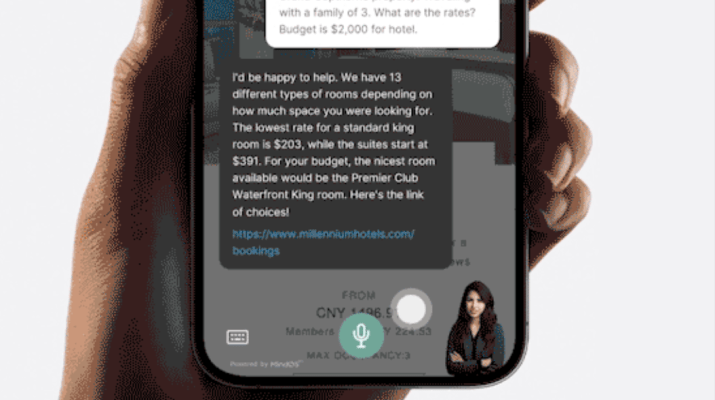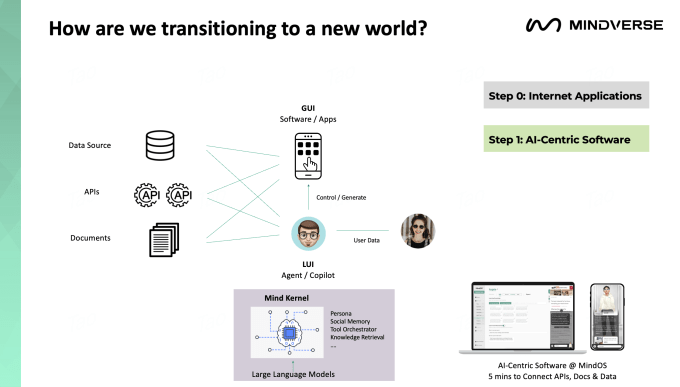AI assistants come to Alibaba and a16z-backed Cider

The generative AI world is evolving so rapidly that every few days we see startups rolling out new applications powered by large language models (LLMs). The latest attempt to monetize artificial intelligence comes from Mindverse AI, a Singaporean startup that is building an API interface, or what founder Fangbo Tao calls a “grounding layer” for businesses, to create smart agents with its own vertical memory and different skill sets using LLMs from OpenAI’s GPT series.
Mindverse’s ChatGPT-like AI agents have already secured early users, including an undisclosed platform inside Alibaba’s ecosystem; a16z-backed fashion startup Cider, which is piloting the virtual assistant; and Hooked, a web3 education platform leveraging the startup’s AI agent to guide users through its site.
Given its traction and investor excitement around conversational AI, it’s no surprise that Mindverse is nearing the completion of a Series A funding round of $10 million. Investors are likely reassured by Tao’s experience working on AI systems at tech behemoths in China and the U.S. After a stint at Facebook building its content understanding platform, Tao joined Alibaba in Hangzhou to help found an in-house AI lab before starting his own company.

Mindverse’s virtual assistant for ecommerce sites. Source: Mindverse AI
Mindverse’s last round, which picked up $7 million, valued it at $45 million and was led by Sequoia China with participation from Linear Capital, K2 Venture, Yinxinggu Capital and Plug and Play.
Mindverse is essentially providing a platform that allows clients to quickly build specialized intelligent agents for different domains. This is what happens when a user lands on a Mindverse-powered ecommerce site: They will be greeted by a chatbot that’s absorbed all the inventory data from the site. Say the buyer asks something like, “What should I wear to my beachside vacation?” The bot will scour the products and show a few options.
Conversing in a human-like manner, the shopping agent is also able to explain the products’ differences and suggest more alternatives if the user isn’t happy with its first recommendations — meaning the bot can learn from real-time conversations.
Similarly, a hotel booking site can use Mindverse to create a virtual guide that recommends places to stay based on simple input like, “I’m planning a trip to San Francisco with my wife.” The locations shown will take into account both the husband’s and the wife’s interests rather than the universal tourist hotspots.
This way of interfacing with web data, said Tao, is fundamentally different from the pre-generative AI era.
“In the past, users were interacting with data sources through software and apps, or GUI [graphical user interface]. What we are doing now is adding an agent or copilot to aid the GUI… by training AI to autonomously learn the API, documents, data sources and instructions that we feed it so the agent can gain skillsets specific to the business scenarios and provide dynamic orchestration of those based on the user’s complex intention,” he explained.

Mindverse AI’s CEO and founder Fangbo Tao explains how generative AI transforms the way we interact with web data. Image: Mindverse
“The biggest difference is that existing recommendation algorithms are heavily reliant on data from the past and you aren’t able to specify your needs,” he continued. “What you click or buy determines what you see. Through [generative AI], on the other hand, you can actively have a back-and-forth interaction with the AI agent that can digest your intention.”
It doesn’t mean recommendation algorithms will become obsolete, though. Mindverse’s agents can in fact compare its recommendations to those from the algorithms that learn from past data. One way to integrate both solutions is to bake the old algorithms into the agent as an API, so the app can learn from users’ past behavior. In fact, any conventional capabilities behind software — beyond recommendation and search — can be baked into AI agents as API skills, the founder pointed out.
“But the AI agent acts on a higher level. By chatting with users, it can better make use of the recommendation and search capabilities so as to plan the best way of using backend data,” said Tao.

